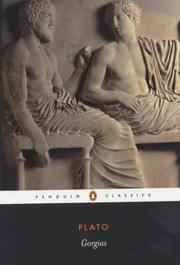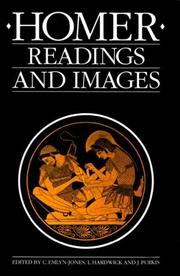| Listing 1 - 9 of 9 |
Sort by
|

ISBN: 0710004702 9780710004703 Year: 1980 Publisher: London: Routledge,
Abstract | Keywords | Export | Availability | Bookmark
 Loading...
Loading...Choose an application
- Reference Manager
- EndNote
- RefWorks (Direct export to RefWorks)
Ionians --- Hellenism --- Ioniens --- Hellénisme --- Ionia (Turkey and Greece) --- Ionie (Turquie et Grèce) --- Civilization --- Civilisation --- Ethnology --- Ionia --- -Civilization --- Hellenism. --- Ionians. --- Civilization. --- Hellénisme --- Ionie (Turquie et Grèce) --- Ionia (Turkey and Greece) - Civilization
Book
Year: 1988 Publisher: s.l. s.n.
Abstract | Keywords | Export | Availability | Bookmark
 Loading...
Loading...Choose an application
- Reference Manager
- EndNote
- RefWorks (Direct export to RefWorks)

ISBN: 9780140449044 Year: 2004 Publisher: London Penguin
Abstract | Keywords | Export | Availability | Bookmark
 Loading...
Loading...Choose an application
- Reference Manager
- EndNote
- RefWorks (Direct export to RefWorks)
Book
ISBN: 0335075525 Year: 1982 Publisher: Milton Keynes Open university press
Abstract | Keywords | Export | Availability | Bookmark
 Loading...
Loading...Choose an application
- Reference Manager
- EndNote
- RefWorks (Direct export to RefWorks)
Book
ISBN: 0335110916 Year: 1981 Publisher: Milton Keynes Open university press
Abstract | Keywords | Export | Availability | Bookmark
 Loading...
Loading...Choose an application
- Reference Manager
- EndNote
- RefWorks (Direct export to RefWorks)

ISBN: 0715624385 Year: 1992 Publisher: London Keynes Duckworth Open University
Abstract | Keywords | Export | Availability | Bookmark
 Loading...
Loading...Choose an application
- Reference Manager
- EndNote
- RefWorks (Direct export to RefWorks)
Book
ISBN: 9780674996519 0674996518 9780674996502 067499650X Year: 2013 Volume: 237, 276 5, 6 Publisher: Cambridge (Mass.): Harvard university press,
Abstract | Keywords | Export | Availability | Bookmark
 Loading...
Loading...Choose an application
- Reference Manager
- EndNote
- RefWorks (Direct export to RefWorks)
The great Athenian philosopher Plato was born in 427 BCE and lived to be eighty. Acknowledged masterpieces among his works are the Symposium, which explores love in its many aspects, from physical desire to pursuit of the beautiful and the good, and the Republic, which concerns righteousness and also treats education, gender, society, and slavery.
Political science --- Utopias --- Early works to 1800 --- Science politique --- Utopies --- Philosophy --- Early works to 1800. --- Philosophie --- Ouvrages avant 1800 --- Histoire. --- Platon, --- Histoire --- Platon --- Political science - Early works to 1800 --- Utopias - Early works to 1800 --- Political science. --- Philosophy, Ancient. --- Utopias.
Book
ISBN: 9780674996878 0674996879 Year: 2017 Volume: 36 1 Publisher: Cambridge (Mass.): Harvard university press,
Abstract | Keywords | Export | Availability | Bookmark
 Loading...
Loading...Choose an application
- Reference Manager
- EndNote
- RefWorks (Direct export to RefWorks)
Works in this volume recount the circumstances of Socrates' trial and execution in 399 BC. Euthyphro attempts to define holiness; Apology is Socrates' defense speech; in Crito he discusses justice and defends his refusal to be rescued from prison; Phaedo offers arguments for the immortality of the soul.
Utopias --- Political science --- Justice --- Philosophy, Ancient --- Philosophy, Ancient. --- Dialogues, Greek. --- Dialogues, Greek --- Socrates. --- Greek literature --- Philosophers --- Political and social views --- Ideal states --- States, Ideal --- Utopian literature --- Civil government --- Commonwealth, The --- Government --- Political theory --- Political thought --- Politics --- Science, Political --- Ancient philosophy --- Greek philosophy --- Philosophy, Greek --- Philosophy, Roman --- Roman philosophy --- Socialism --- Voyages, Imaginary --- Dystopias --- Social sciences --- State, The --- Scholars --- Balkan literature --- Byzantine literature --- Classical literature --- Classical philology --- Greek philology --- Socrates --- Early works to 1800 --- Utopias - Early works to 1800 --- Political science - Early works to 1800 --- Justice - Early works to 1800 --- Political and social views of a person
Book
ISBN: 9780674997431 0674997433 0674997433 Year: 2022 Publisher: Cambridge, Massachusetts: London: Harvard University Press,
Abstract | Keywords | Export | Availability | Bookmark
 Loading...
Loading...Choose an application
- Reference Manager
- EndNote
- RefWorks (Direct export to RefWorks)
"Plato of Athens, who laid the foundations of the Western philosophical tradition and in range and depth ranks among its greatest practitioners, was born to a prosperous and politically active family circa 427 BC. In early life an admirer of Socrates, Plato later founded the first institution of higher learning in the West, the Academy, among whose many notable alumni was Aristotle. Traditionally ascribed to Plato are thirty-five dialogues developing Socrates' dialectic method and composed with great stylistic virtuosity, together with the 'Apology' and thirteen letters. The three works in this volume, though written at different stages of Plato's career, are set toward the end of Socrates' life (from 416) and explore the relationship between two people known as love ('erōs') or friendship ('philia'). In 'Lysis,' Socrates meets two young men exercising in a wrestling school during a religious festival. In 'Symposium,' Socrates attends a drinking party along with several accomplished friends to celebrate the young tragedian Agathon's victory in the Lenaia festival of 416: the topic of conversation is love. And in 'Phaedrus,' Socrates and his eponymous interlocutor escape the midsummer heat of the city to the banks of the river Ilissus, where speeches by both on the subject of love lead to a critical discussion of the current state of the theory and practice of rhetoric."-- "Plato's Lysis, Symposium, and Phaedrus were written at different periods of his long productive life, ranging from his early period to the late middle, roughly the late 390s/early 380s to the 370s BC. Although differing widely from each other in setting and approach, the works are grouped together here by virtue of their principal subject matter, a study of the relationship between two people known as love (erōs) or friendship (philia). As with almost all of Plato's works, they are in dialogue form, the central character in all three being Socrates. They are set (one might say 'staged') during the last period of Socrates' life, ca. 416-399."--
Philosophy, Ancient. --- Love --- Friendship --- Dialogues, Greek. --- Dialogues, Greek --- Love. --- Plato. --- Lysis (Plato) --- Phaedrus (Plato) --- Symposium (Plato) --- Dialogues (genre littéraire) grecs.
| Listing 1 - 9 of 9 |
Sort by
|

 Search
Search Feedback
Feedback About UniCat
About UniCat  Help
Help News
News